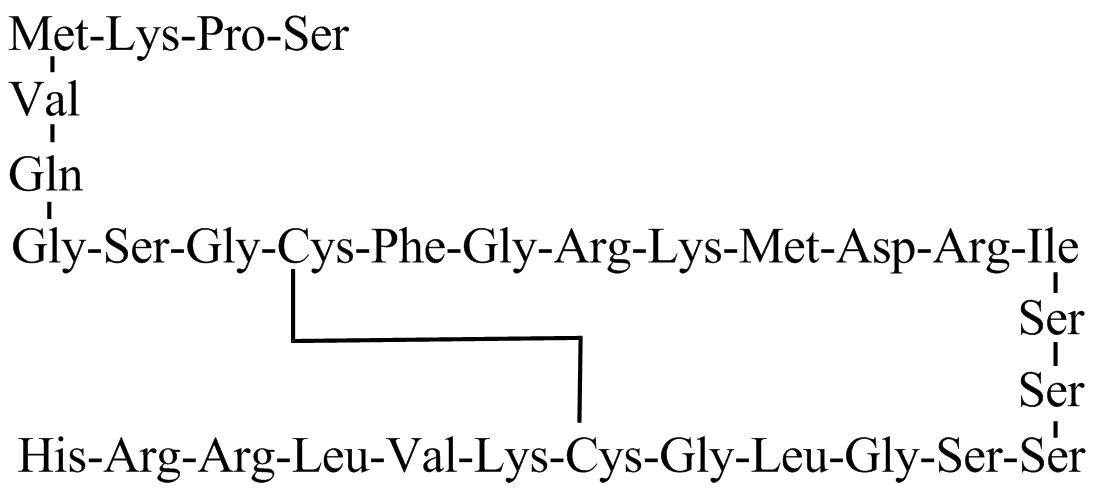Nesiritide
 | |
| Clinical data | |
|---|---|
| Routes of administration | IV only |
| ATC code | |
| Identifiers | |
| E number | {{#property:P628}} |
| ECHA InfoCard | {{#property:P2566}}Lua error in Module:EditAtWikidata at line 36: attempt to index field 'wikibase' (a nil value). |
| Chemical and physical data | |
| Formula | C143H244N50O42S4 |
| Molar mass | 3464 g/mol |
|
WikiDoc Resources for Nesiritide |
|
Articles |
|---|
|
Most recent articles on Nesiritide |
|
Media |
|
Evidence Based Medicine |
|
Clinical Trials |
|
Ongoing Trials on Nesiritide at Clinical Trials.gov Clinical Trials on Nesiritide at Google
|
|
Guidelines / Policies / Govt |
|
US National Guidelines Clearinghouse on Nesiritide
|
|
Books |
|
News |
|
Commentary |
|
Definitions |
|
Patient Resources / Community |
|
Patient resources on Nesiritide Discussion groups on Nesiritide Patient Handouts on Nesiritide Directions to Hospitals Treating Nesiritide Risk calculators and risk factors for Nesiritide
|
|
Healthcare Provider Resources |
|
Causes & Risk Factors for Nesiritide |
|
Continuing Medical Education (CME) |
|
International |
|
|
|
Business |
|
Experimental / Informatics |
Editor-In-Chief: C. Michael Gibson, M.S., M.D. [1]
Nesiritide (Natrecor®) is a medication used to treat acutely decompensated congestive heart failure with dyspnea at rest or with minimal exertion (such as talk, eating or bathing). Nesiritide is the recombinant form of the 32 amino acid human B-type natriuretic peptide, which is normally produced by the ventricular myocardium. Nesiritide works to facilitate cardiovascular fluid homeostasis through counterregulation of the renin-angiotensin-aldoesterone system, stimulating cyclic guanosine monophosphate, leading to smooth muscle cell relaxation. In simpler terms, it promotes vasodilation, natriuresis, and diuresis.
Administration
Nesiritide is only administered intravenously, usually by bolus, followed by IV infusion. For most adults and the elderly, a normal dosage is 2 micrograms/kilogram followed by a continuous IV infusion of 0.01 mcg/kg/minute. This may be increased every three hours for a maximum of 0.03 mg/kg/min.
Correction - maximum dose is 0.03 MCG/kg/minute, not MG.
Side effects
Common side effects include:
- Low blood pressure (11% of patients)
- Headache
- Nausea
- Slow heart rate
More rare side effects include:
Recommendations for use (as of 7/13/2005)
There have been several meta-analysis which have identified issues of increased mortality and increased renal dysfunction with use of nesiritide compared to usual therapy. As a result, the company which manufactures nesiritide (Scios), consulted with Dr E Braunwald to develop recommendations for use.[1] They are as follows:
- The use of nesiritide should be strictly limited to patients presenting to the hospital with acutely decompensated heart failure who have dyspnea at rest, as were the patients in the largest trial that led to approval of the drug (VMAC). Physicians considering the use of nesiritide should consider its efficacy in reducing dyspnea, the possible risks of the drug (refers to meta-analysis), and the availability of alternate therapies to relieve the symptoms of congestive heart failure.
- Nesiritide should not be used to replace diuretics. Furthermore, because insufficient evidence is not currently available to demonstrate benefit for the applications listed below,
- NESIRITIDE SHOULD NOT BE USED:
- for intermittent outpatient infusion
- for scheduled repetitive use
- to improve renal function
- to enhance diuresis
Notes
References
- Hodgson, Barbara B., and Kizior, Robert J. Saunders Nursing Drug Handbook 2006. St. Louis, MO: Elsevier, Saunders, 2006.
- Science or Fiction: Use of Nesiritide as a First-Line Agent? John A. Noviasky, Pharm.D., Michael Kelberman, M.D., Karen M. Whalen, B.S., Roy Guharoy, Pharm.D., William Darko, Pharm.D.[2]
External links
- Pages with script errors
- Pages using duplicate arguments in template calls
- E number from Wikidata
- ECHA InfoCard ID from Wikidata
- Chemical articles without CAS registry number
- Articles without EBI source
- Chemical pages without ChemSpiderID
- Chemical pages without DrugBank identifier
- Articles without KEGG source
- Articles without InChI source
- Articles without UNII source
- Drugs with no legal status
- Articles containing unverified chemical infoboxes
- Drugs
- Cardiology